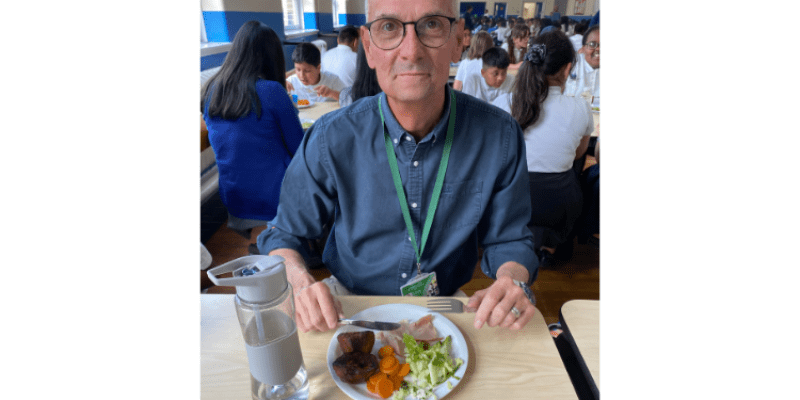
Dr Nick Capstick, chief executive of the Swindon-based White Horse Federation of 31 schools is at the forefront of an initiative aimed at stopping children going to school hungry.
He is the independent chair of the National School Reform Working Group made up of around 30 organisations including teachers, academics, caterers, food suppliers and charities.
Nick 62, is battling cancer but has also taken on the role of head of one of his schools in Swindon-Drove Primary, as well as overseeing all the White Horse Federation schools in Wiltshire, Reading and Oxford.
To say the least he is something of an educational dynamo who played a big part with the BBC in getting laptops for children to study at home during the Covid lockdowns.
He is brutally honest when he tells me how food poverty is affecting the health of school children, and cites the appalling case of an 11-year-old girl who has just had 12 teeth extracted due to poor diet.
Nick tells me: “As educationalists we are increasingly seeing children coming in with poor dentition and increasing obesity.
“We are seeing more children having time off school and that means parents have to have time off from work.
“So, as a result productivity goes down. Wages go down because they are having time off work and then food poverty becomes even greater.
“In just 12 months 160, 000 more children have become eligible for free school meals.
“Food poverty linked with fuel poverty linked with the cost of living means increasingly families are making choices. When they go to the food bank they are saying they don’t even want food that they need to cook.
“They can’t even afford to put the cooker or oven on. We are looking at a lot of ready baked cakes and biscuits with high sugar which is going to affect a whole range of other things.
“The government have come out with some laudable proposals, which medium and long-term people can applaud.
“But at the moment we have a food policy crisis which is affecting kids every day.
“We are a group of people who have a vested interest either as educationalists, food suppliers or food charities to try and bring about change, not for our own sake, but because there is an impact.
“We know that young people who go to breakfast clubs perform better at school. If that’s the case, UK PLC will get children who have performed better at school, and therefore, future employees will be better qualified and better motivated.
“Their work ethic will be better.
“This is not about education, it is not about the health service, it is about all our lives.
“We are part of G7 and are one of the richest countries in the world and yet 2 million kids live in food poverty.
“More and more parents are ashamed about their kids having free school meals-it is a stigma for them.
“It stigmatises them and makes them feel embarrassed and ashamed.
“As a result of that we increasingly have parents going into debt. Parents I know are going to money lenders and sometimes not the best money lenders. It is a vicious circle.
“We need employers to realise that they are being impacted by this. We are going to see more parents taking time off because of stress of having to cope.
“I think it is seeing the real cost of food poverty. They are coming in to work every day and they could have skipped meals.
“It will affect their concentration and their productivity. This is just not a school problem, it is an employer’s problem and it is a societal problem. It is one we can’t all be but ashamed of.
“We are now seeing some children going hungry.
“The reality, however, for the threshold for free school meals is that the householder has to earn less than £7,400 to be eligible.
“That is a ridiculous wage—it is £14,000 in Northern Ireland. In Scotland and Wales, free school meals are universal.
“So, the least we might do is to make a claim for those on Universal Credit.
“Universal free school meals for all children would take away all the stigma for parents and children falling through the cracks.
“We also need to look at how food is paid for because, increasingly, we are seeing that caterers cannot afford to tender for school contracts because the price per unit at £2.30 doesn’t make it attractive.
“That is the price per meal, and it is just not enough. Caterers are not able to buy local produce and go to foreign manufacturers, so their carbon footprint increases.
“We would like to see the price of a meal go up so caterers can employ decent chefs and buy decent ingredients.
“It could cost up to £670 million. When you consider that the government are putting in £37 billion into Levelling Up surely this would be a great way of Levelling Up?
I talked to Nick the day after the government revealed its National Food Strategy, a brilliant piece of work from Henry Dimbelby but largely ignored by government on key challenges like a sugar tax.
Nick, who helped drive the national laptops for kids effort during Covid, said he had just got “lip service” from government to his group’s free school meals initiative.
“You can be trusted on laptops for schools but not on food for schools.
They say they will keep school meals in mind when the crisis is now”, he says.
“We are not looking to bludgeon the government—we are looking to work with them and industry for a solution. This is not a political point”.
Nick Capstick tells me the sad story of two mothers from one school who came to him in tears.
“They had just been arrested for shoplifting - they had never shoplifted in their life. They just couldn’t afford the food for their kids.
“They went for the cheapest products at the supermarket - that was the level of their honour and nobility”.
- Log in to post comments

